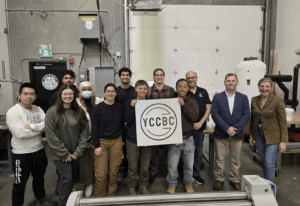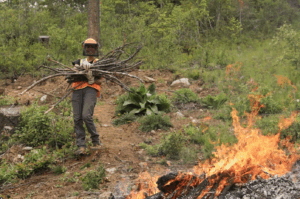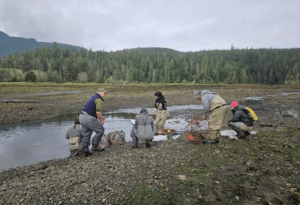Youth Climate Corps
Projects Sponsor
Since its launch in 2020, Youth Climate Corps BC (YCCBC) has scaled rapidly to engage over than 100 young British Columbians in paid, hands-on climate action across more than ten communities, from urban centres to remote Indigenous Nations. Completing 10,000 working days, delivering projects in climate mitigation, adaptation, and community resilience: from wildfire preparedness and energy retrofits to ecosystem restoration and local food systems. Alongside advancing workforce readiness for young people, YCCBC has helped accelerateurgent community climate projects.
YCCBC was created to address two urgent challenges: youth underemployment and the escalating climate crisis. Founders saw an opportunity for young people to earn a living wage while gaining skills through climate projects that communities urgently need.
The team found that youth experiential programs are extremely effective in promoting workforce development, community connection, and personal growth. They also saw a workforce gap in BC and Canada that will grow significantly as baby boomers retire in the next decade. Especially in the trades.
 YCCBC founders recognized that youth will be impacted by the climate crisis throughout their lives. Given this, climate justice and a just transition mean ensuring that young people, especially young people from marginalized communities, benefit from climate solutions.
YCCBC founders recognized that youth will be impacted by the climate crisis throughout their lives. Given this, climate justice and a just transition mean ensuring that young people, especially young people from marginalized communities, benefit from climate solutions.
It was also clear to the founders that many local governments struggle to implement on the ground climate plans and specifically face difficulties educating residents on climate-related incentives and programs. It was equally clear that a tremendous amount of adaptation work is not being implemented at the size and scale needed to adequately prepare communities for a heating climate. Notable gaps include wildfire mitigation, extreme heat preparedness, building retrofits, and ecosystem restoration.
Based on these findings, YCC set some key objectives: upskill young people in good careers related to climate action and utilize young people to support communities in reducing emissions and adapting to the heating climate. Key to these goals is paying young people a living wage to act on climate in their communities. This model helps young people with issues related to climate anxiety, connection to community and, last but not-at-all least, affordability.
From 2020 to 2023, YCCBC took the care and time necessary to carefully develop its program and build partnerships. During this phase of development, the Wildsight Society, a non-profit with deep connections in the Columbia Basin, ran YCCBC pilot projects in the East and West Kootenays.
In 2023, YCCBC ran their first pilot projects in Vancouver, Alert Bay and Kamloops and in February 2024, they received a three-year, $3 million grant from the province of BC to expand programming. Since then, YCCBC have expanded significantly, and they’ve already been able to witness their work pay off.
As of January 2025, YCCBC has created measurable outcomes for youth and communities across BC:
• 106 youth employed in paid climate action roles
• 10,000+ days of hands-on climate work completed
• 75% of alumni are now working in climate-related jobs or education
• 92% report professional growth, and 86% report personal growth through the program
YCC has now operated in twelve different communities across BC, with partnerships with local governments, First Nations, environmental and youth groups, and the Province of BC.
In partnership with the City of Kamloops, the Climate Friendly Homes initiative educates residents on making climate-friendly changes to their homes. An impressive 86% of residents who participated reported that they would be making changes based on the recommendations. The Kamloops project in 2023 also serviced over 1,000 bikes at the community bike valet. Also working with the District of Squamish on “light touch” air sealing in homes, to help increase energy efficiency in some homes by 10-21%.

In partnership with Tsawwassen First Nation and Metro Vancouver Regional Parks Foundation, YCCB’s 2024 Vancouver program restored two hectares of Burns Bog and removed around 10,000 pine saplings, ensuring the unique and important carbon sink remains true to its vital boggy self.
Of course, there were growing pains. The team had to balance scaling rapidly, building excitement and attracting partners and funders while ensuring that the team is engaging in projects that will not burn out or overwhelm them. These growing pains aside, though, the ability to scale up, with each year showing growth, is one of YCC’s strengths.
With the initial investment of $3 million from the province of BC, YCC has been able to leverage philanthropic and local government funding to double the amount of program funding and develop stronger systems for delivering YCC programs. With partnerships with First Nations, trade unions, local governments and environmental NGOs now in place, YYC is part of a diverse coalition that is currently scaling climate action in a way that is cost-effective and impactful.
In 2024, YYC partnered with the Insulators Union on a three-month pre-apprenticeship project. This project gave young people an opportunity to experience a career with extra coaching support from Youth Climate Corps. Gratifyingly, all seven of the participants who finished the program are now in a formal apprenticeship program pursuing careers in the field of reducing emissions in buildings—a growing field, one that is in the midst of a labour shortage. YYC has also developed unique projects with ‘Namgis First Nation, the Skeena Watershed Conservation Coalition, and many local governments.
For young people inspired to take action on climate, recycling and turning off the lights is not enough. They need access to real hands-on projects that are based in communities.
One alumni, Kate Watt, commented, “I don’t think it’s an exaggeration to say that being part of the YCC has significantly changed my life for the better. The program has provided me with new job skills and opportunities. From teaching me to identify trees, learning how to operate a chainsaw, designing a forest garden, and more, I’ve gained skills that will benefit me moving forward. Because of the YCC, I’ve secured a new job that will begin once the program ends, where I’ll be working as a program coordinator and junior policy analyst in the realm of food security. I think the YCC is about more than job opportunities, however. Participating in the Youth Climate Corps has shifted my values and worldview, and it has also provided me with a deep sense of purpose.”
That speaks for itself and maybe for the better part of a generation.













